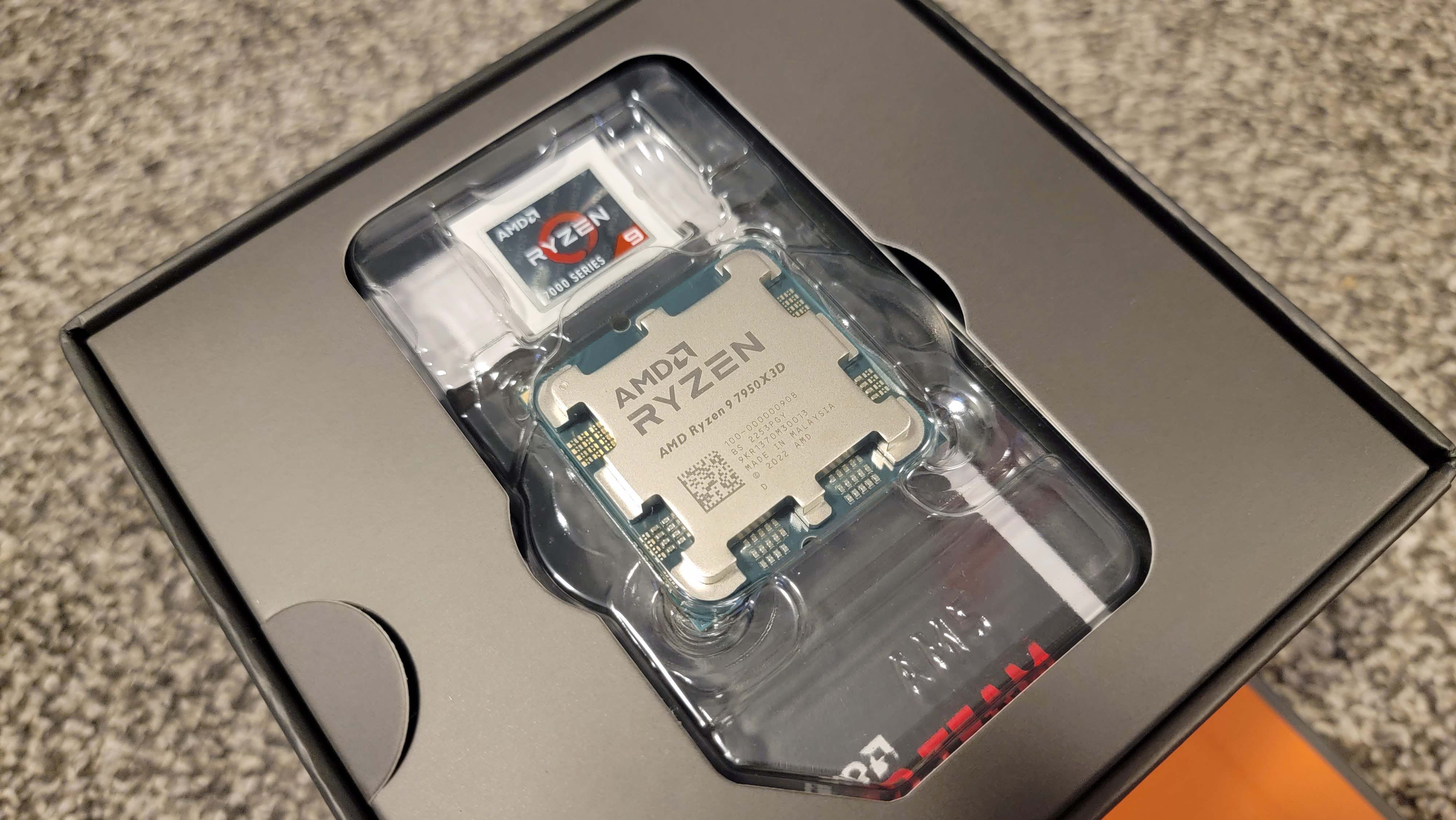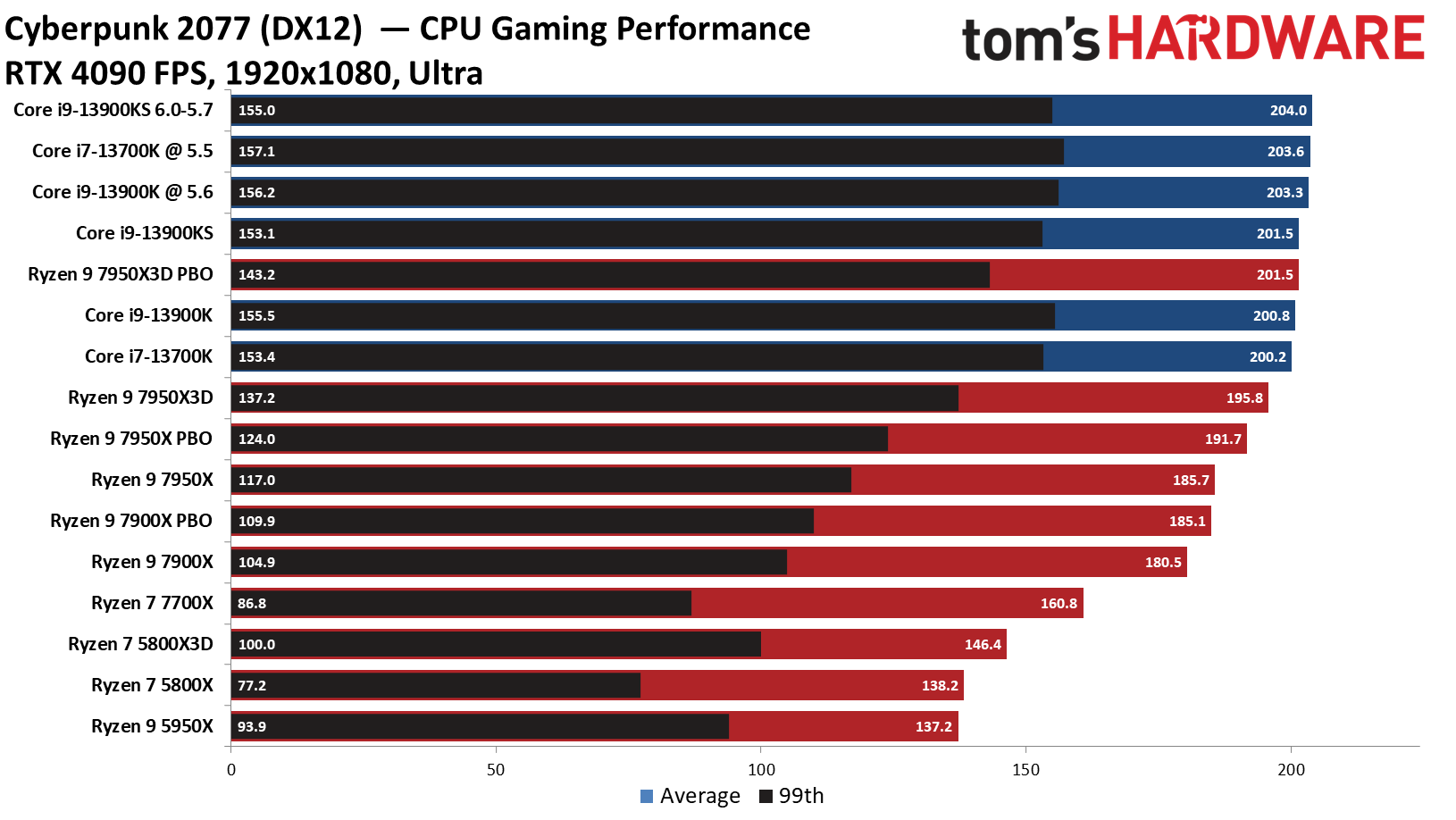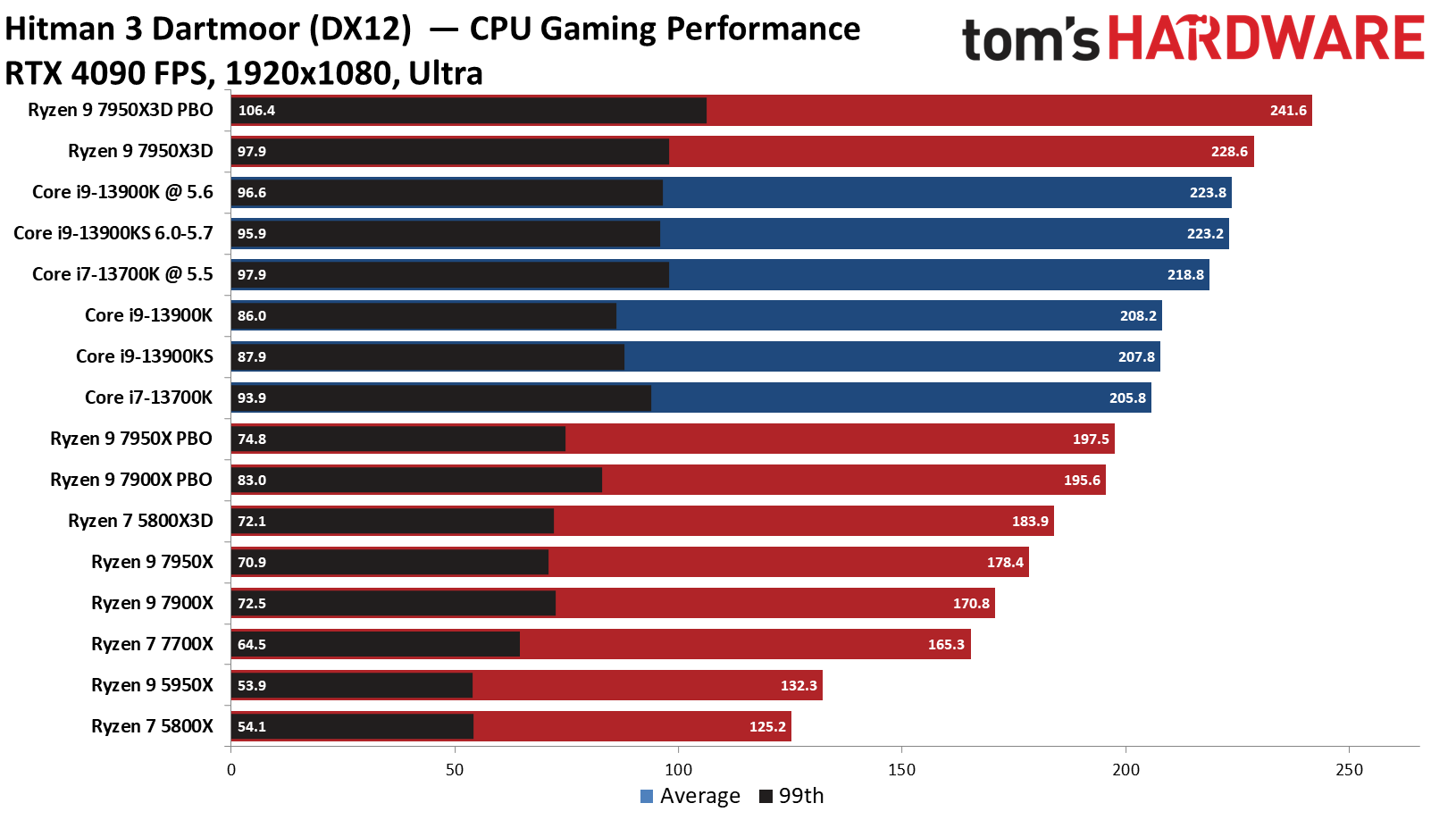Why you can trust Tom's Hardware
AMD Ryzen 9 7950X3D Gaming Benchmarks — The TLDR
- Ryzen 9 7950X3D: Corsair H115i 280mm water cooler, default power limits, DDR5-5200 (Coupled Mode)
- Ryzen 9 7950X3D PBO/UV: Corsair H115i 280mm water cooler, Precision Boost Overdrive (Advanced/Motherboard), Scalar 10X, -25 Curve Optimizer, DDR5-6000 EXPO (Coupled Mode)
You can find the particulars of our overclock and test setup on the previous page. Here we have the geometric mean of our gaming tests at 1080p and 1440p, with each resolution split into its own chart. We're testing with an Nvidia GeForce RTX 4090 to reduce GPU-imposed bottlenecks as much as possible, and differences between test subjects will shrink with lesser cards or higher resolutions and fidelity. You'll find further game-by-game breakdowns below.
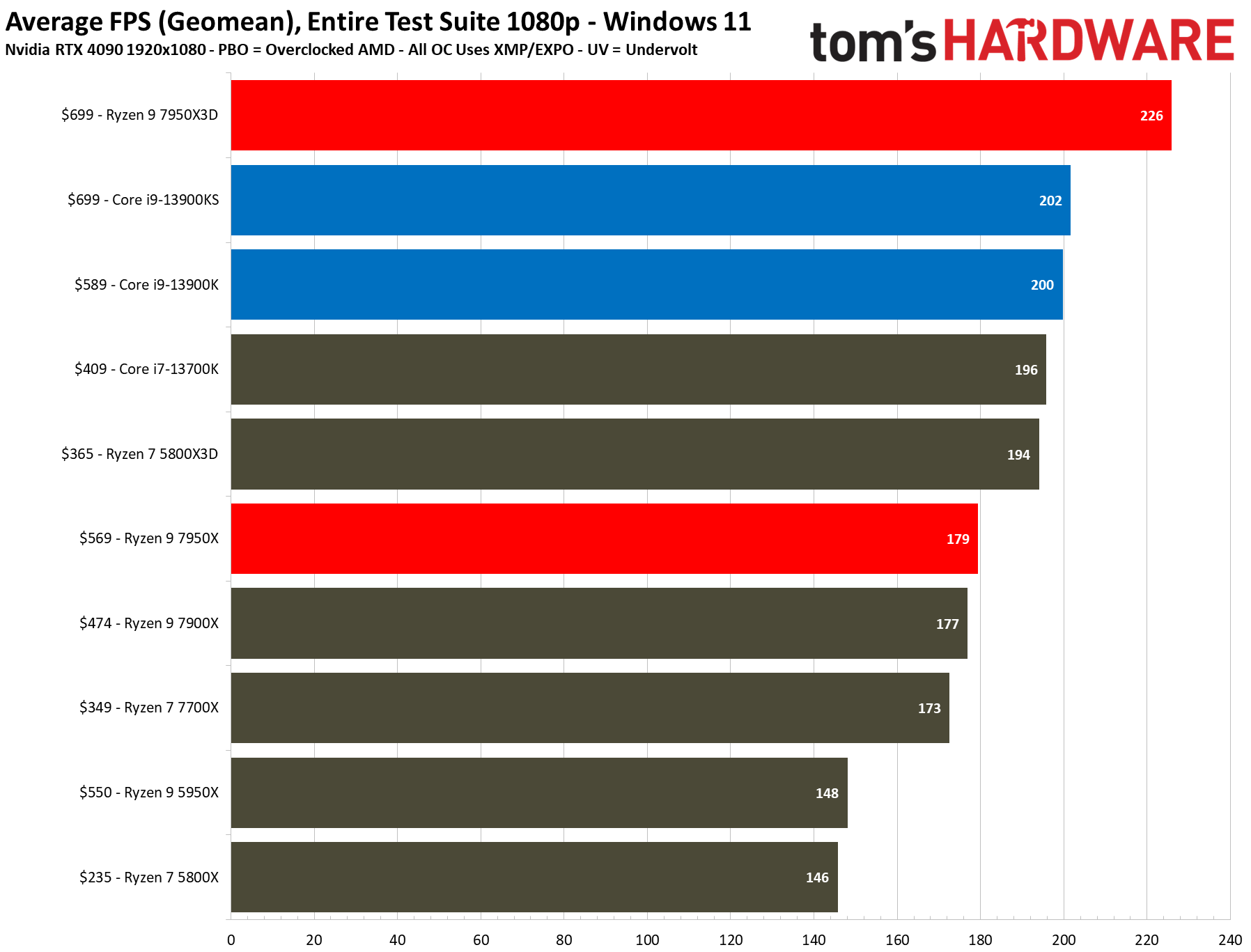
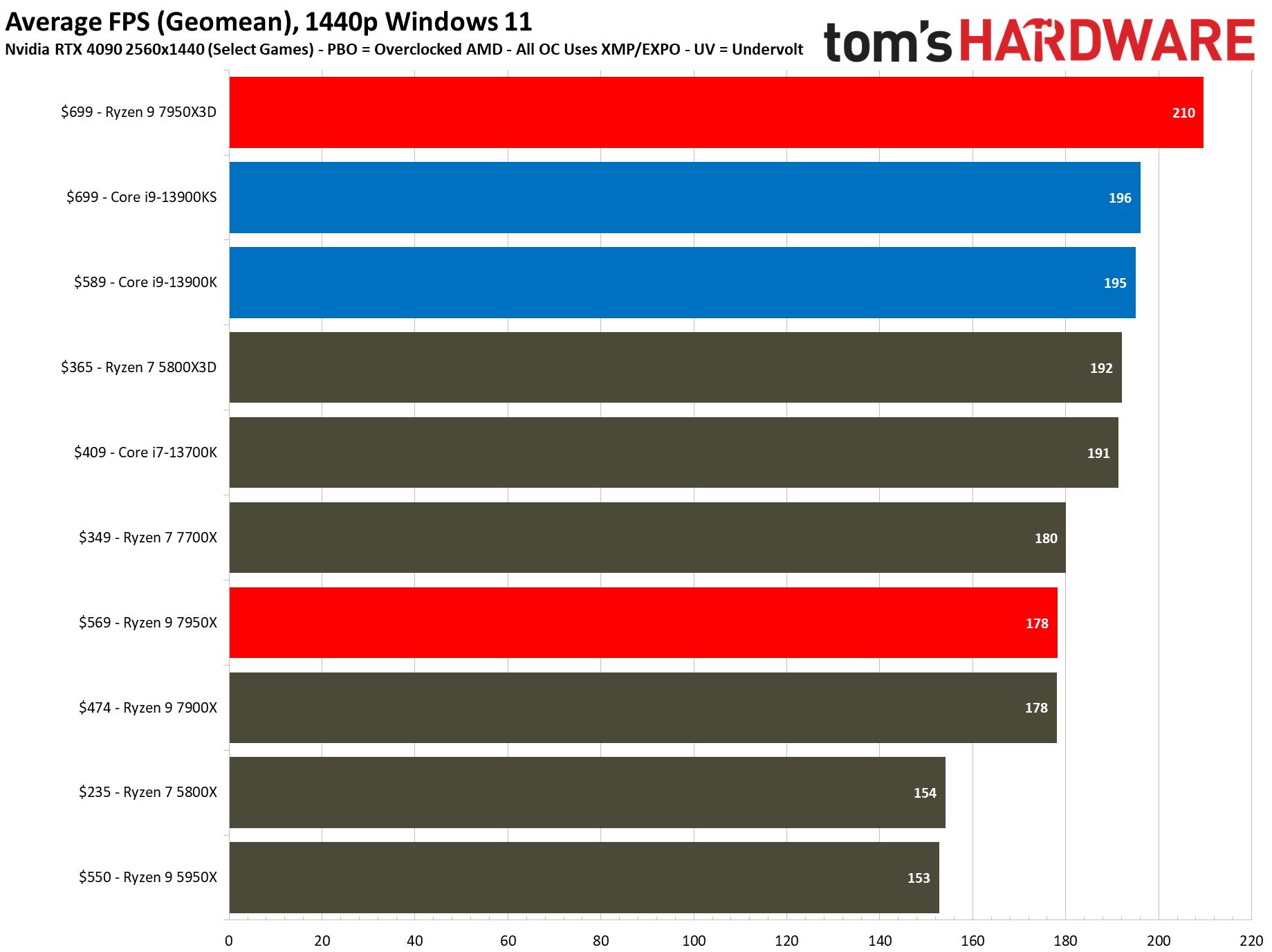
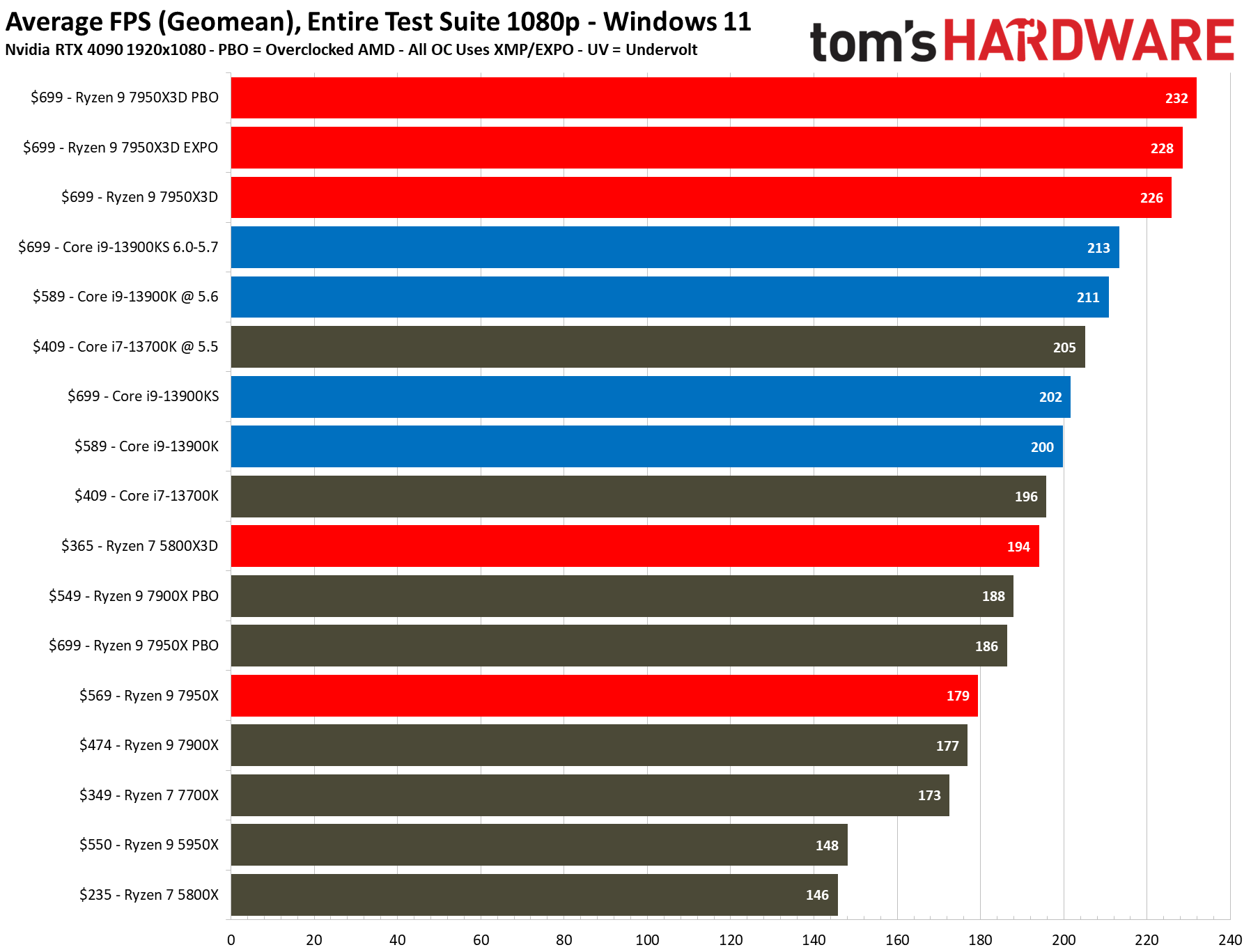
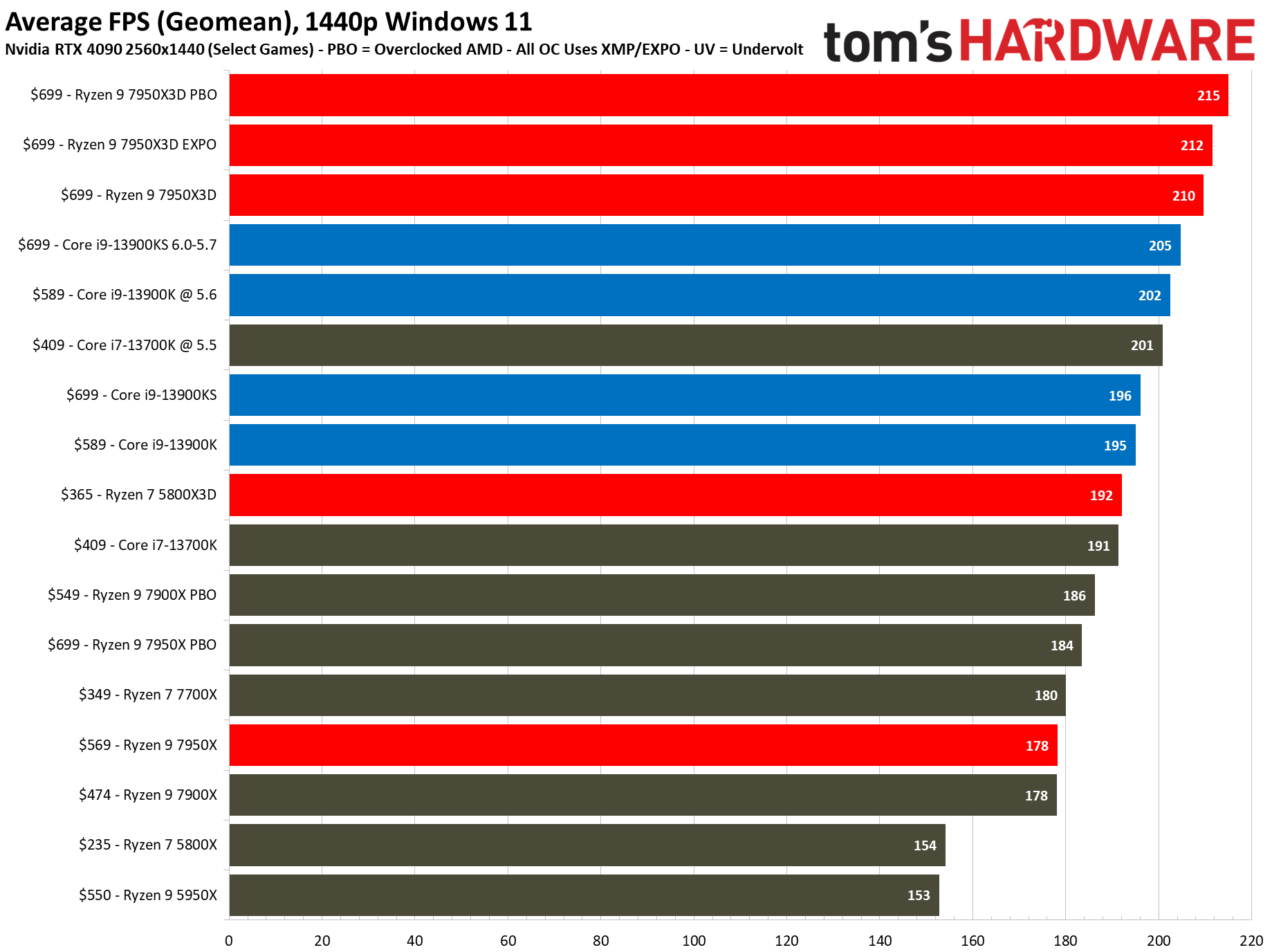
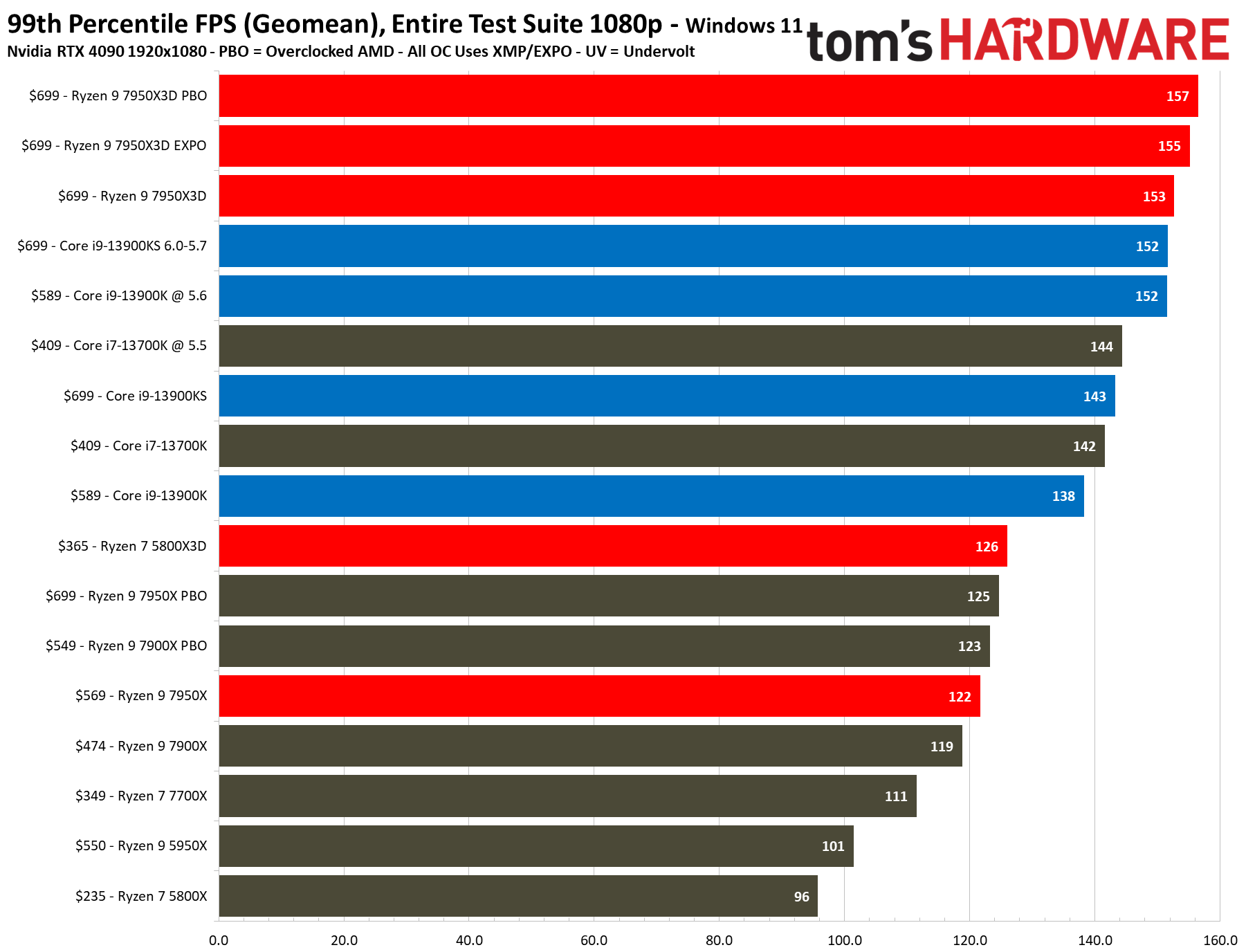
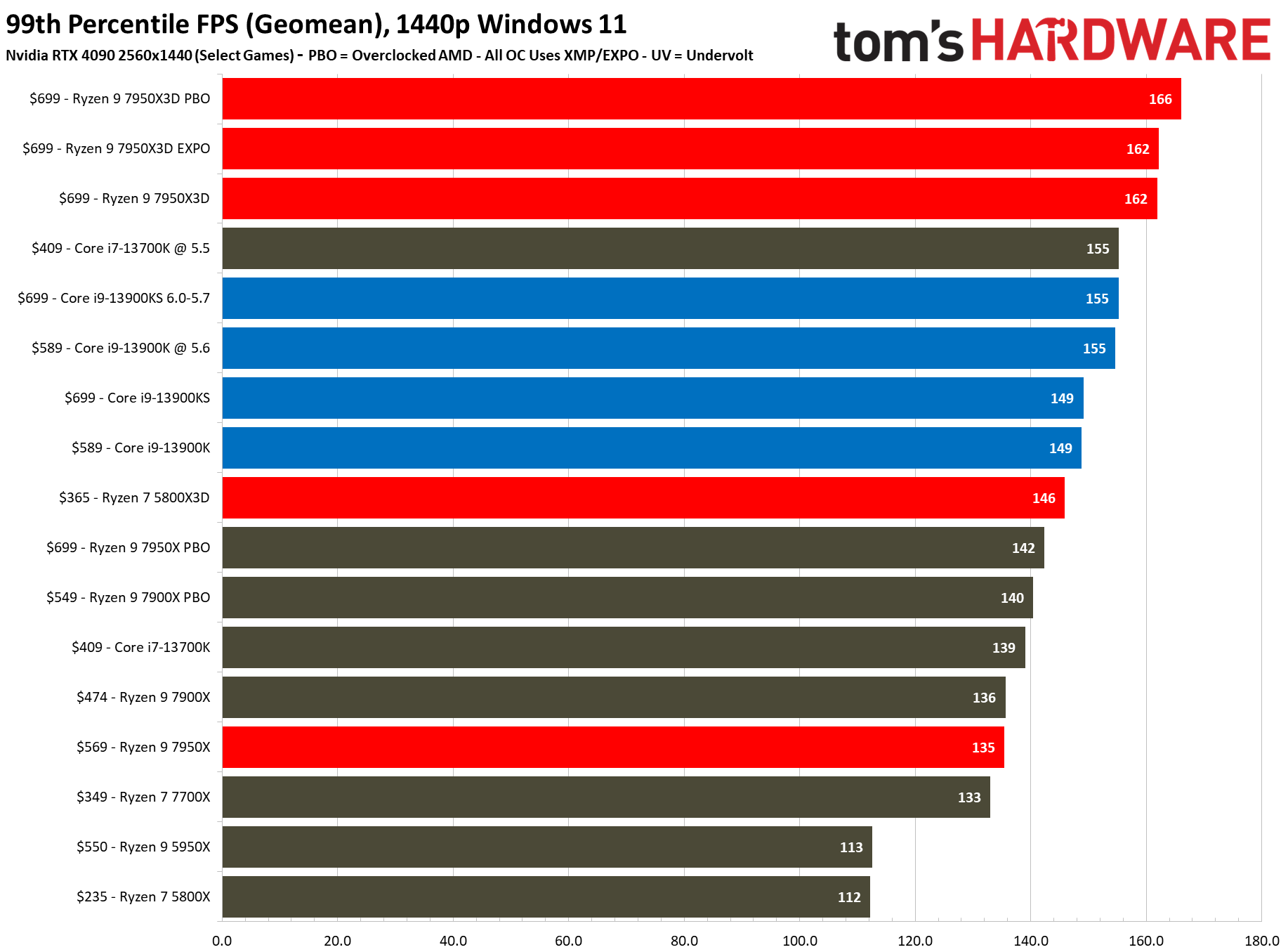
The first slides are simplified without the overclocking configs, while the remainder contains the full roster of tested configurations. The $699 Ryzen 9 7950X3D lives up to its billing as the fastest gaming chip in the world, beating out Intel’s flagships by massive margins in some titles. We also see that trend in this geometric mean of our test suite but be aware that the 3D V-Cache doesn’t accelerate all titles equally, so you’ll have to assess the trends in the individual game benchmarks below.
Intel released its $699 Core i9-13900KS as a preemptive strike against the 7950X3D, but despite its impressive 6 GHz boost clock and big price tag, it offers basically the same performance as the $589 Core i9-13900K. As such, the 13900K is the real challenger here. Given that the K and KS chips are basically identical, they both suffer the same fate — the 7950X3D is 12% faster at 1080p gaming at stock settings and 9% faster when the chips are overclocked. The latter score is a bit discouraging for Intel, as its chips consume far more power yet still can't beat the 7950X3D.
The Ryzen 9 7950X3D is an incredible 26% faster than the 7950X, now giving AMD’s Zen 4 the overall lead. The 7950X3D’s gain over the 7950X also nearly matches the 32% performance gain for the previous-gen Ryzen 7 5800X3D over the non-V-Cache 5800X, both of which had a single CCD. This shows that AMD’s new thread scheduling techniques have successfully helped it navigate the complexities of employing 3D V-Cache acceleration on a dual-CCD processor.
The Ryzen 9 7950X3D delivers an exceptional generational uplift — it’s 16% faster than the previous-gen Zen 3 Ryzen 7 5800X3D, a byproduct of the newer Zen 4 architecture, more cores, and higher frequencies.
While the Ryzen 9 7950X3D is unashamedly positioned for the highest-end gaming possible, chips like the $409 Core i7-13700K remain attractive for those looking for high-performance systems with a lower price tag (it offers nearly the same level of gaming performance as the 13900K), at least until the $449 Ryzen 7 7800X3D comes to market in April.
Enabling the EXPO memory profile brings our memory speeds from the stock DDR5-5200 to Ryzen’s sweet spot at DDR5-6000, which yields less than a 1% improvement in performance. However, that’s not entirely bad; it means you can pair the chip with cheap DDR5 memory and get nearly the best performance available.
We also paired the EXPO profile with AMD’s auto-overclocking Precision Boost Overdrive (PBO), but this also yielded a limited gain of 2.5% over the stock configuration. Most of this gain comes from PBO’s higher power settings. PBO does provide a small extra boost to gaming performance, so we’ll include the PBO results in our full game tests below but hold back the EXPO results to keep the charts clean. Notably, underclocking via the Curve Optimizer provides similar performance improvements to PBO but uses less power. We found that some games prefer underclocking while others prefer the standard PBO, with the net effect being a wash in our cumulative gaming metrics.
Our test suite heavily favors the improvements from 3D V-Cache, so we also included a table with results from an additional five games that we don’t normally test. Those extra titles aren't factored into the cumulative measurements above, but they show the same general trends. You’ll also find AMD’s own benchmarks in a broad range of titles at the end of this page to give you a better idea of performance in other games.
| Tom's Hardware | 1080p Game Benchmarks |
| $699 — Ryzen 9 7950X3D | 100% |
| $699 — Core i9-13900KS | 89.3% |
| $589 — Core i9-13900K | 88.4% |
| $409 — Core i7-13700K | 86.7% |
| $569 — Ryzen 9 7950X | 79.4% |
| $358 — Ryzen 7 5800X3D | 85.9% |
Cyberpunk 2077 Benchmarks on AMD Ryzen 9 7950X3D
The Ryzen 9 7950X3D is 5% faster than the vanilla 7950X in Cyberpunk 2077, but the Core i9-13900KS stays in the lead with an 8% advantage. However, engaging the one-click PBO and EXPO profile levels the playing field, bringing the 7950X3D within 1% of the fastest overclocked Intel model, the 6 GHz Core i9-13900KS.
The Ryzen 9 7950X3D won’t provide much performance uplift over the standard Zen 4 models in all titles, which is important to remember — not all games benefit from the 3D cache-stacking tech.
Far Cry 6 Benchmarks on AMD Ryzen 9 7950X3D
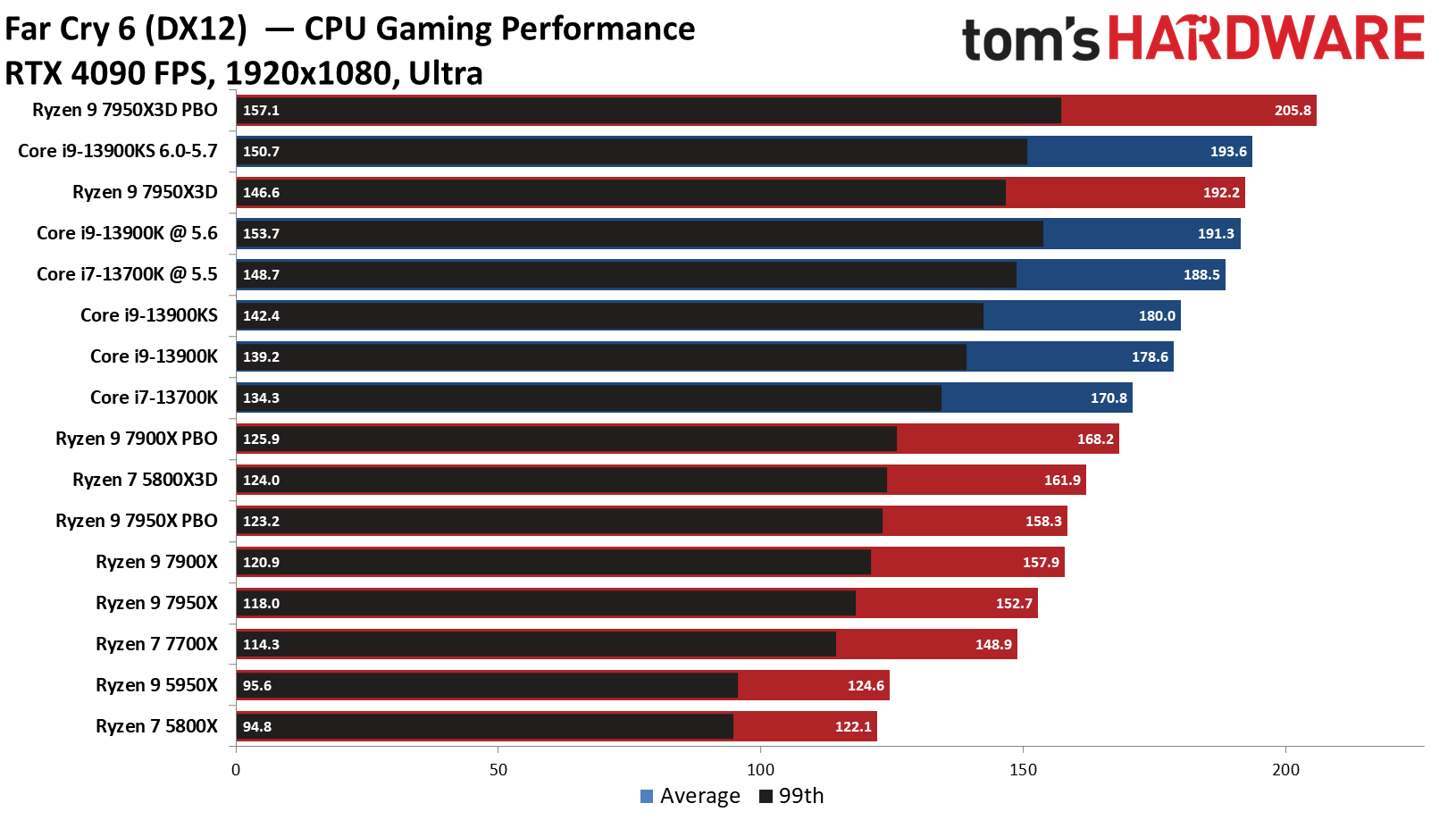
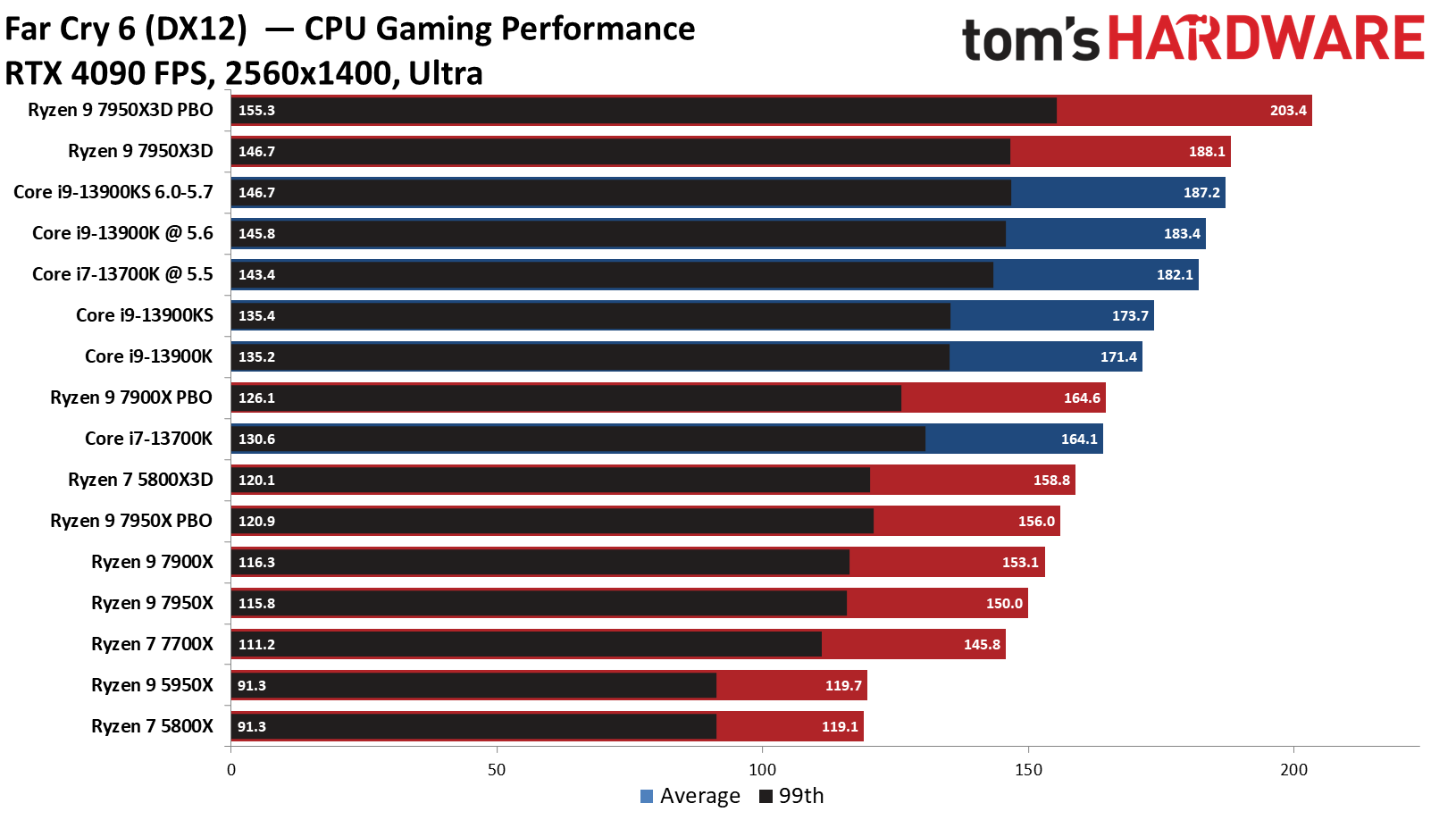
Far Cry 6 is sensitive to memory performance, so its no surprise to find the stock 7950X3D beating the stock 13900KS by 7%, which is more impressive because the Intel silicon is rated for twice the power consumption at its peak 320W power setting than the 7950X3D. You’ll have to overclock the 13900KS to basically tie the 7950X3D, but engaging PBO and EXPO keeps the 7950X3D at the top of the chart by a significant margin.
F1 2021 Benchmarks on AMD Ryzen 9 7950X3D
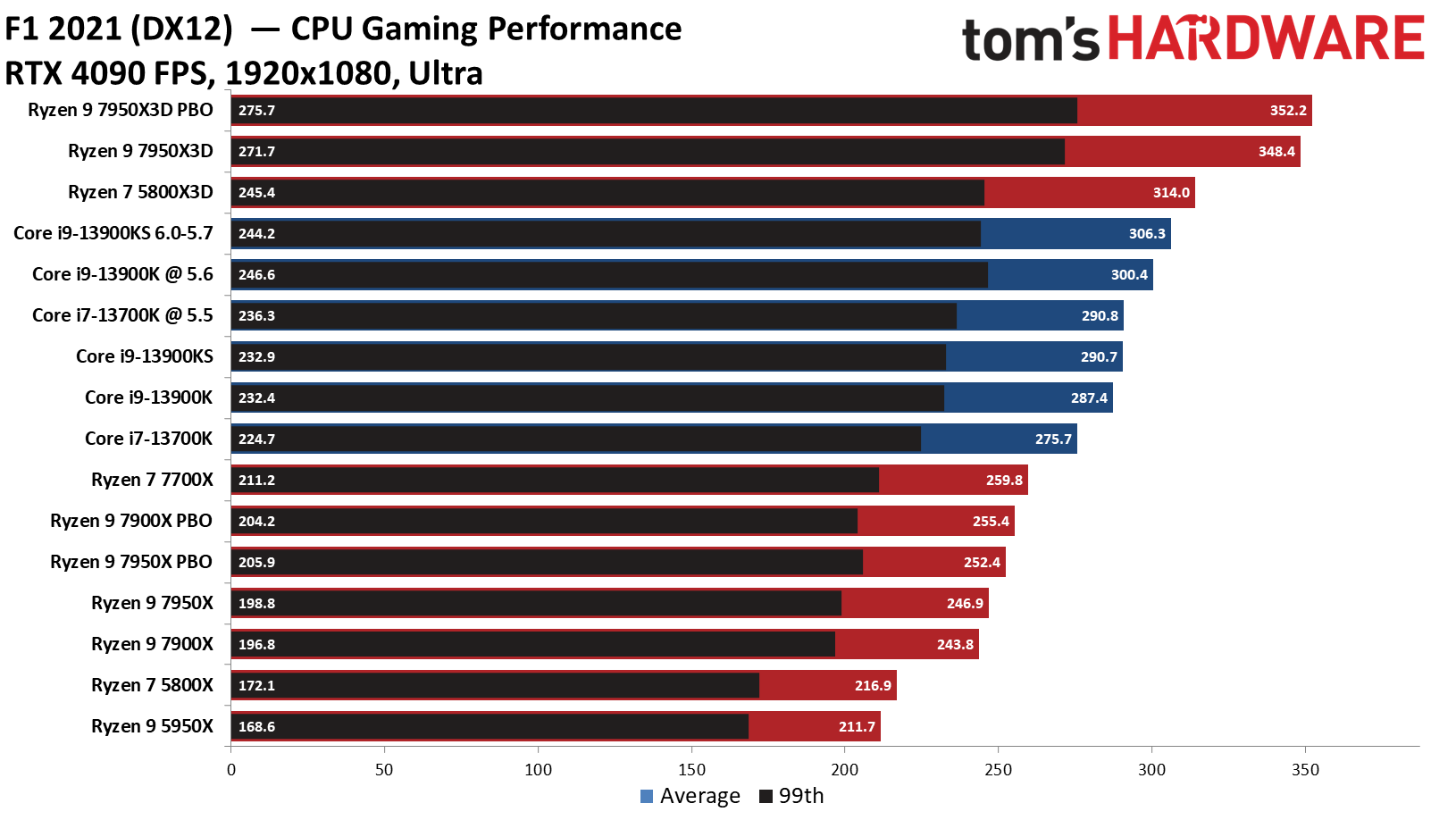
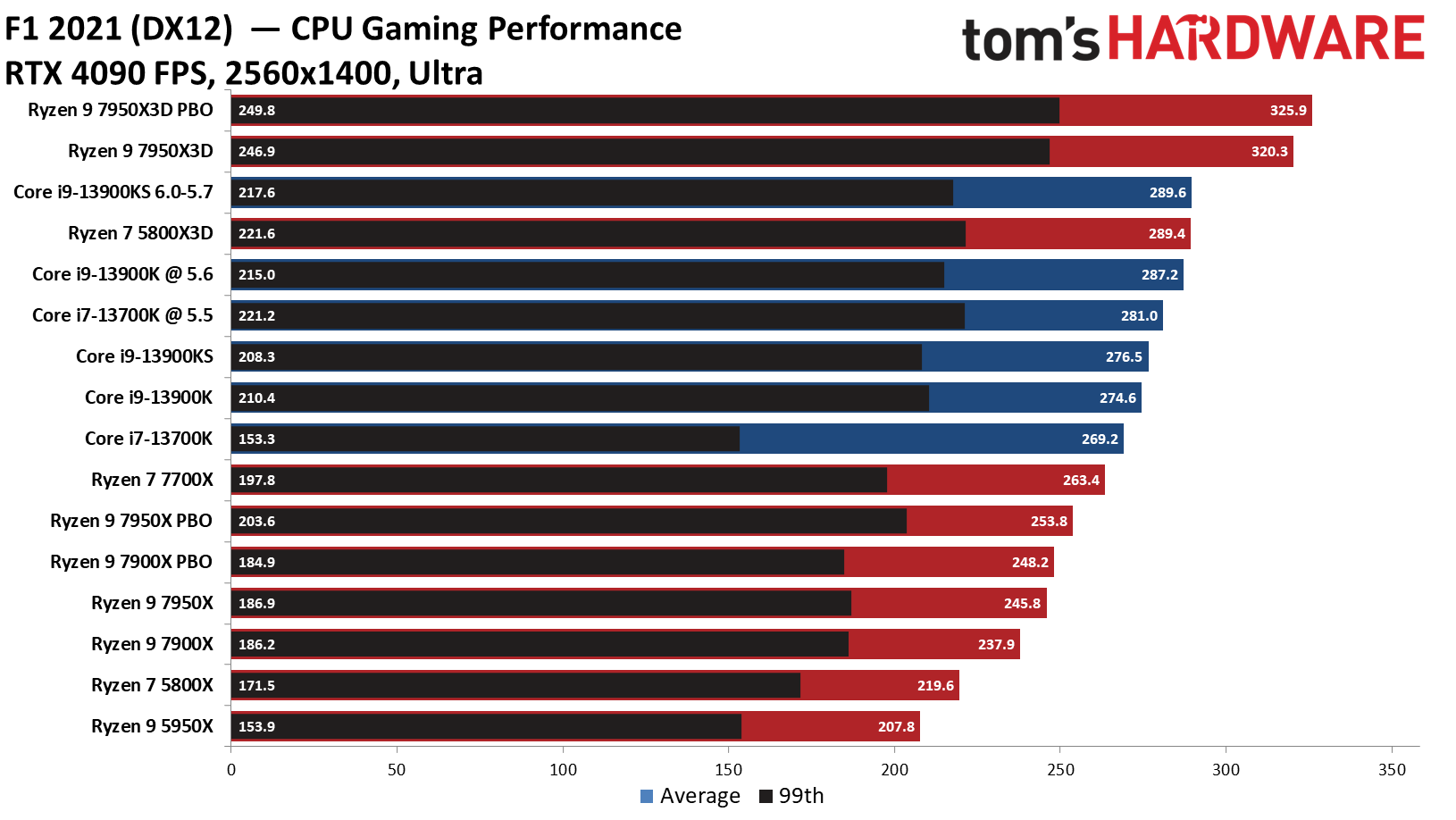
It’s obvious that F1 2021 enjoys a massive boost from the increased L3 capacity — the Ryzen 7 5800X3D with first-gen 3D V-Cache was an incredible 44% faster than its non-V-Cache counterpart, the Ryzen 7 5800X. We don’t see quite the same amount of gain with the 7950X3D, but its 38% lead over the 7950X is still incredibly impressive. The 7950X3D is also 22% faster than the 13900K, dispatching it easily in this test, and overclocking Intel’s silicon only reduces the lead to 17%.
Hitman 3 Benchmarks on AMD Ryzen 9 7950X3D
Hitman 3 is designed specifically to leverage the e-cores for certain game engine tasks, which has typically given Intel an advantage. However, the game also apparently loves the 7950X3D’s extra slab of L3 cache, as the chip is 10% faster than the 13900K at stock settings, and it maintains an 8% lead after overclocking both chips.
Microsoft Flight Simulator 2021 Benchmarks on AMD Ryzen 9 7950X3D
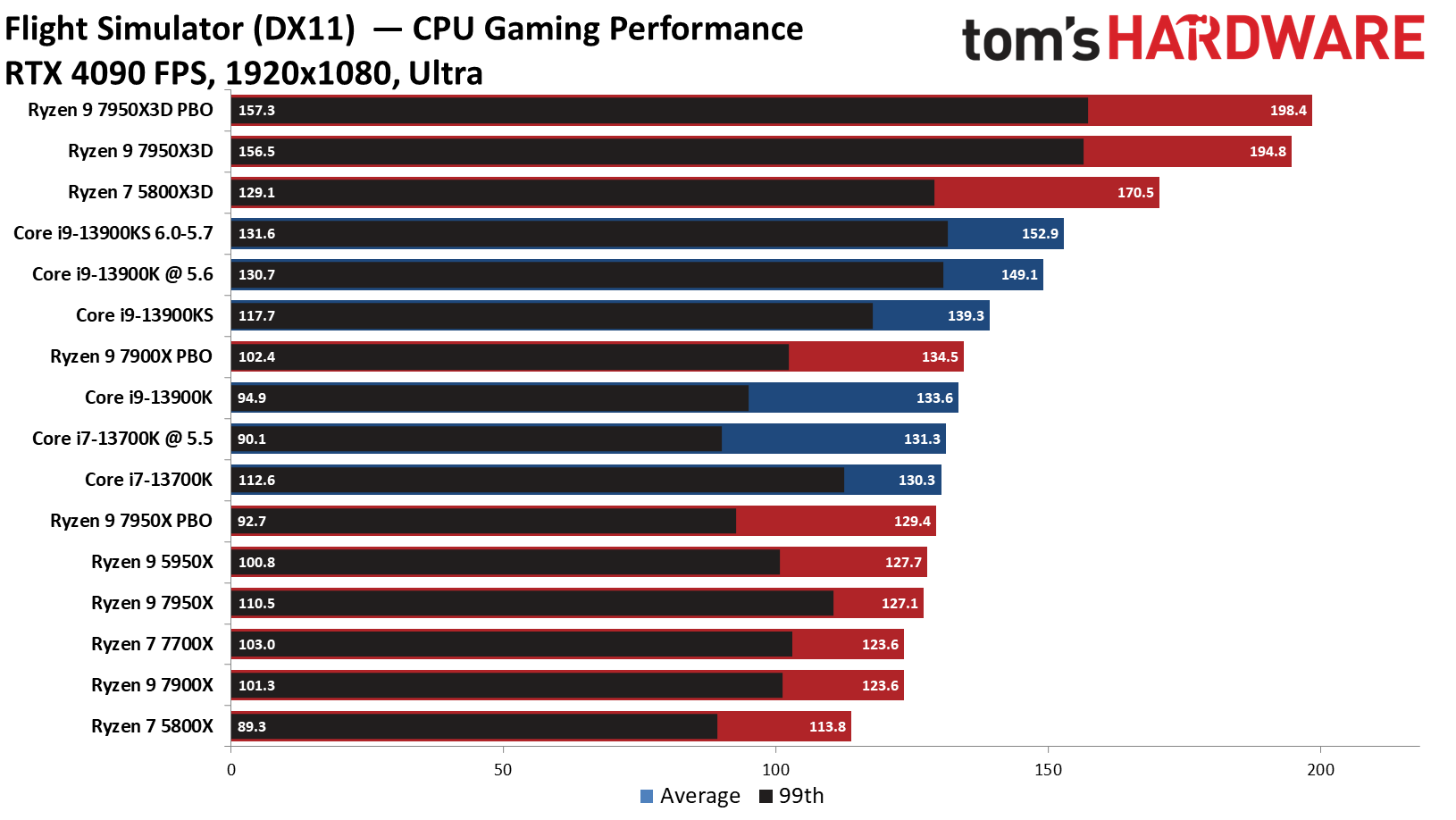
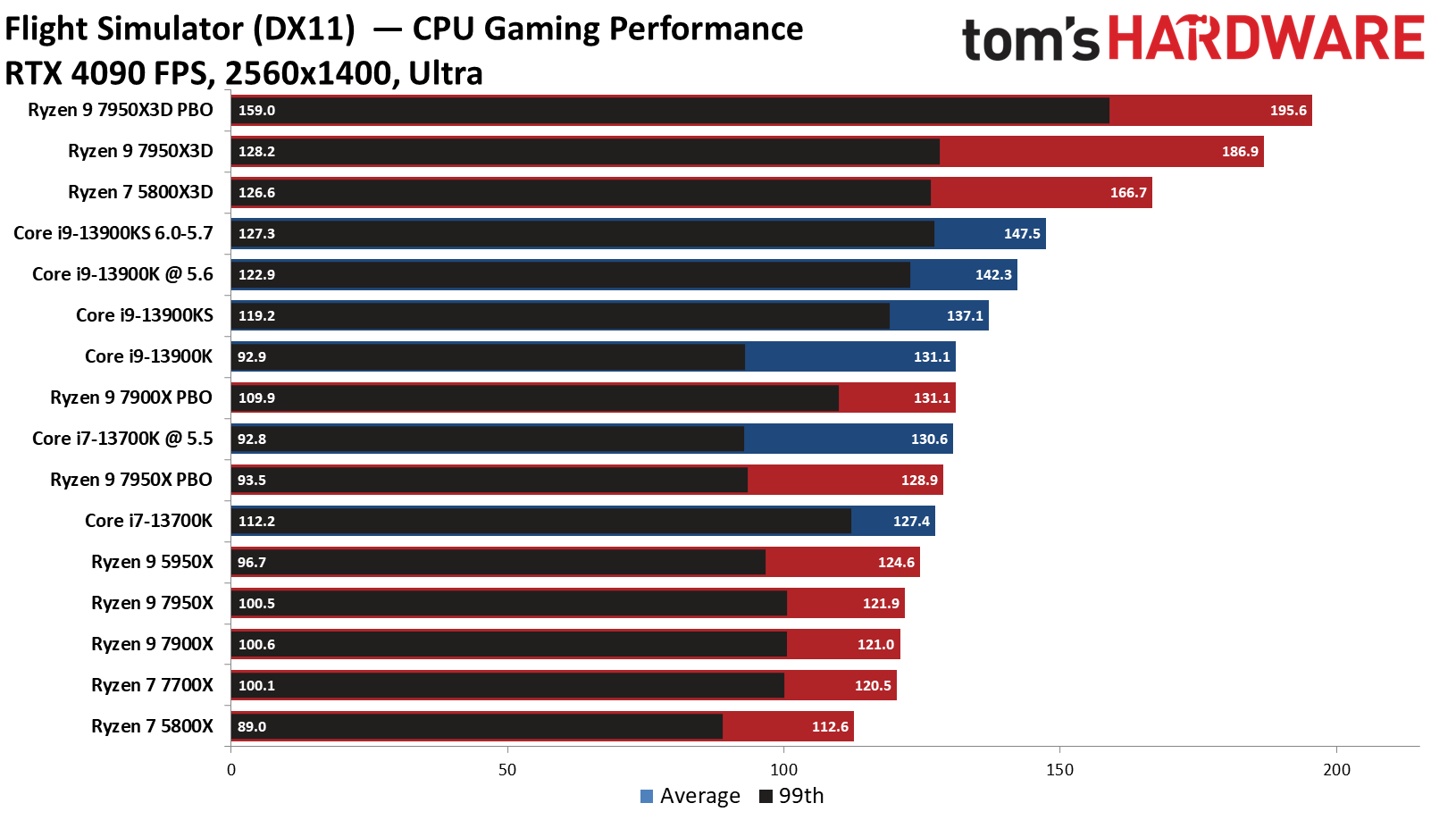
The 7950X3D’s performance in Microsoft Flight Simulator 2021 is almost unbelievable — the X3D chip is 53% faster than its vanilla counterpart, the 7950X, and 43% faster than the 13900K at stock settings. Again, the jump in performance over the standard model is very similar to the 5800X vs 5800X3D, with the latter having a 49% uplift. This shows that AMD has managed to wring out similar gains from a dual-CCD chip as it did with the single-CCD 5800X/3D.
Microsoft Flight Simulator 2021 obviously benefits tremendously from L3 cache, but that doesn't represent the 7950X3D's performance in all titles. This illustrates how outliers can make the 7950X3D seem more impressive in cumulative measurements, so be sure to examine performance in individual games.
Get Tom's Hardware's best news and in-depth reviews, straight to your inbox.
Red Dead Redemption 2 Benchmarks on AMD Ryzen 9 7950X3D
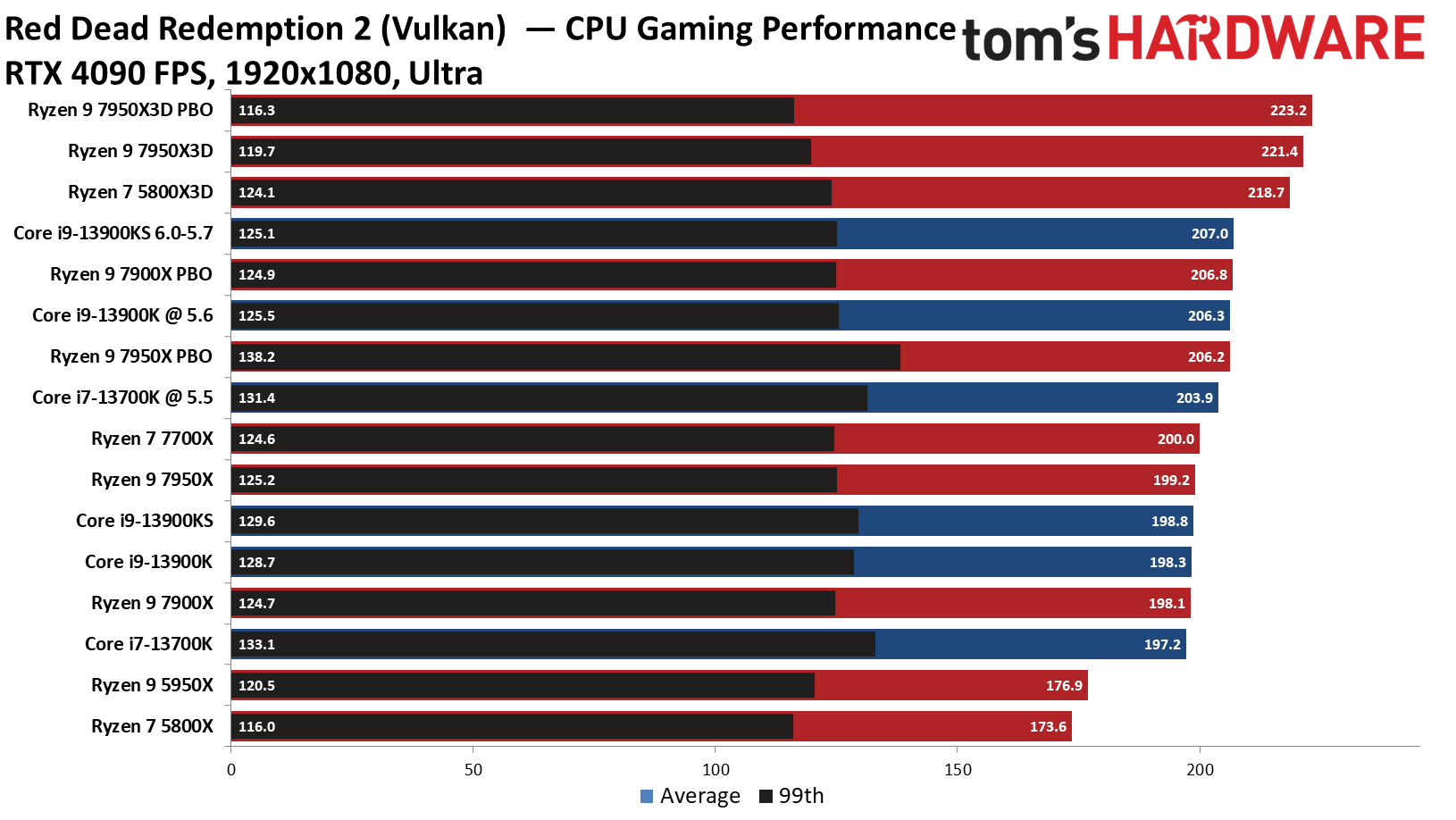
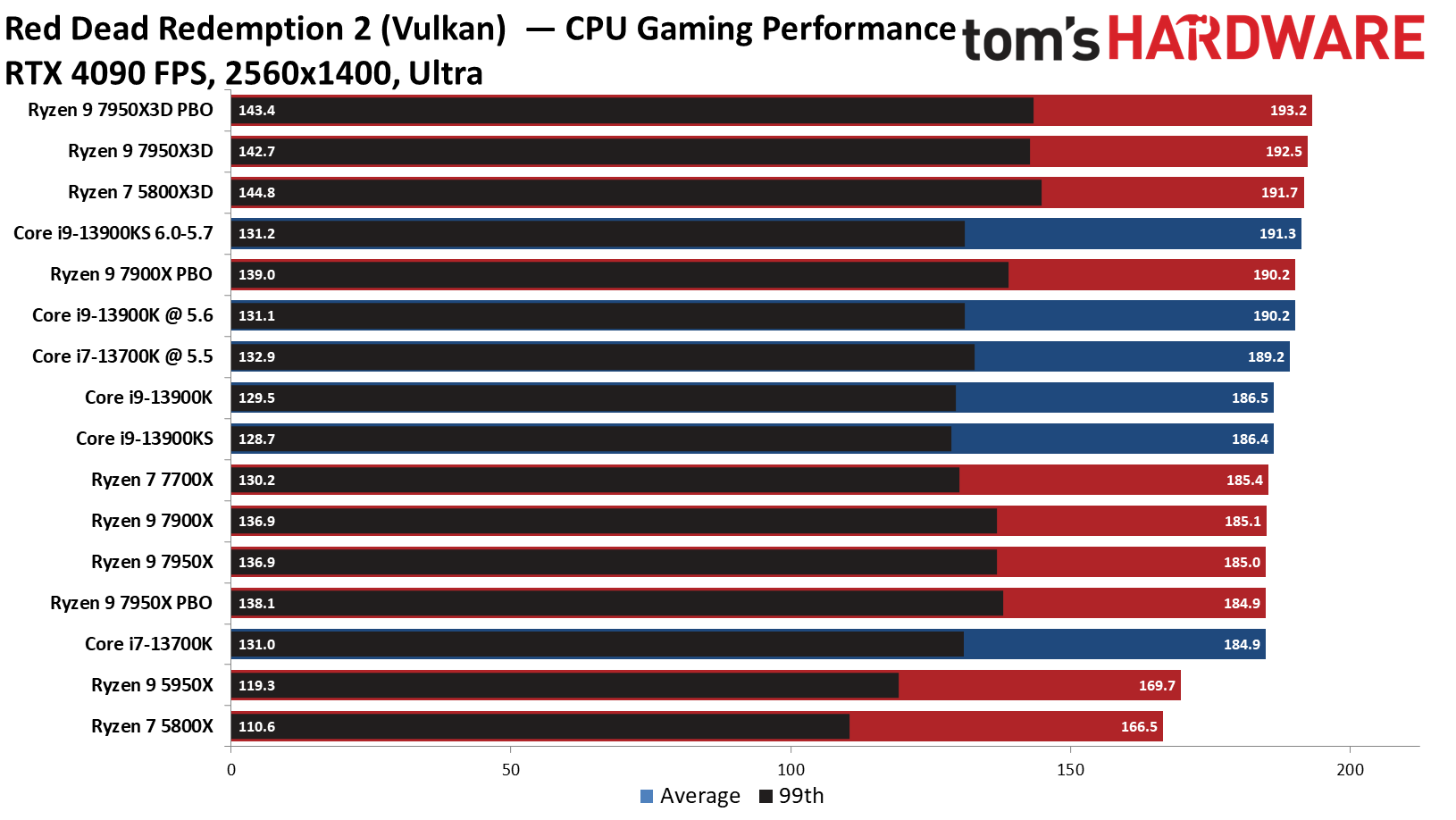
Red Dead Redemption 2 also benefits from the extra L3 cache, with the 7950X3D speeding ahead of the 13900K by 12% and beating the vanilla 7950X by 11%. However, there is an interesting caveat with this title — the $699 7950X3D is only 1% faster than the $365 5800X3D that also comes with the value-centric AM4 platform and supports DDR4 memory. There’s also another constant trend in our benchmarks — the $409 Core i7-13700K offers nearly the same performance as the $589 13900K, but for $180 less. As such, carefully weigh your options, as both camps have cheaper alternatives.
Warhammer 3 Benchmarks on AMD Ryzen 9 7950X3D
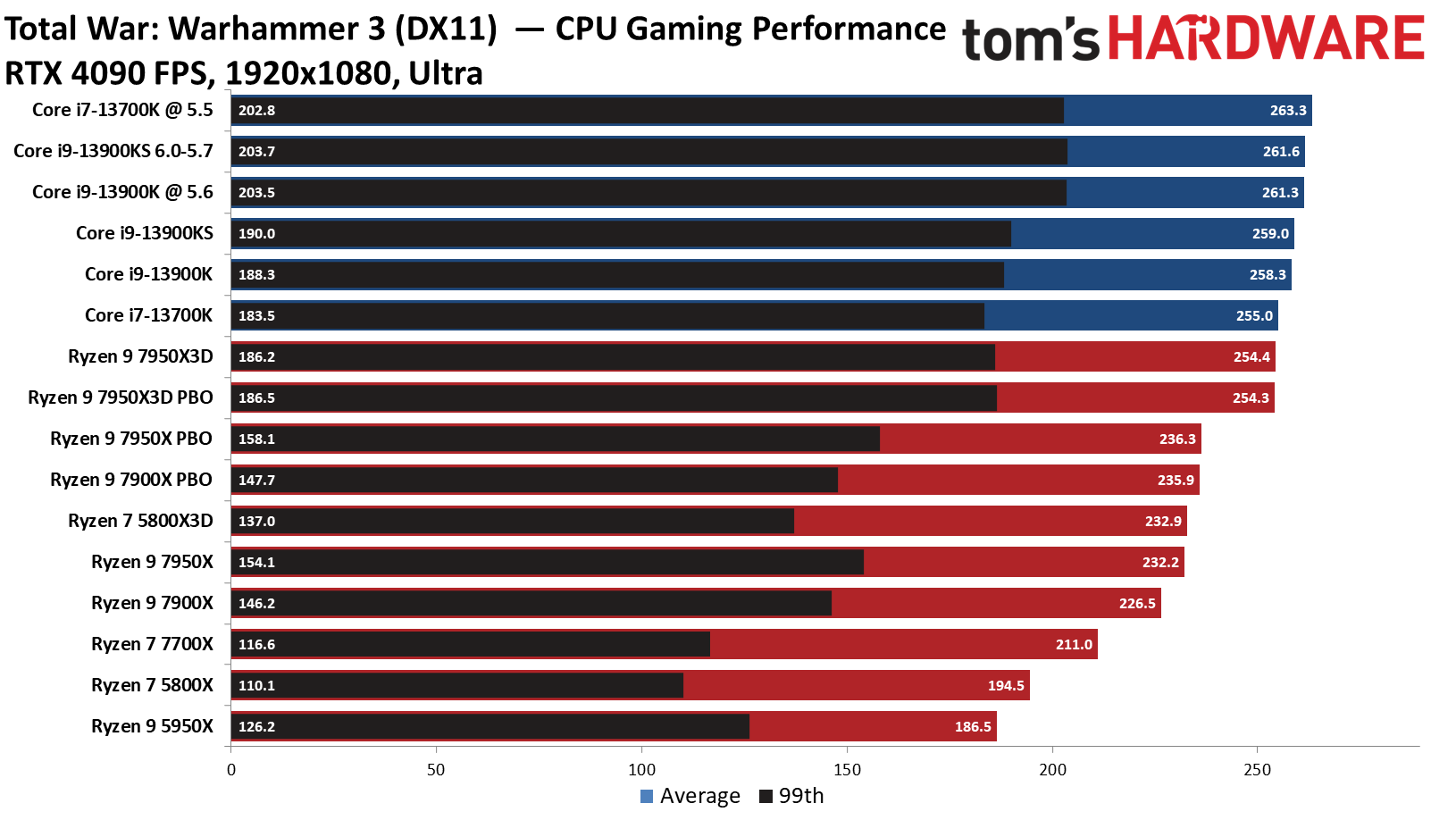
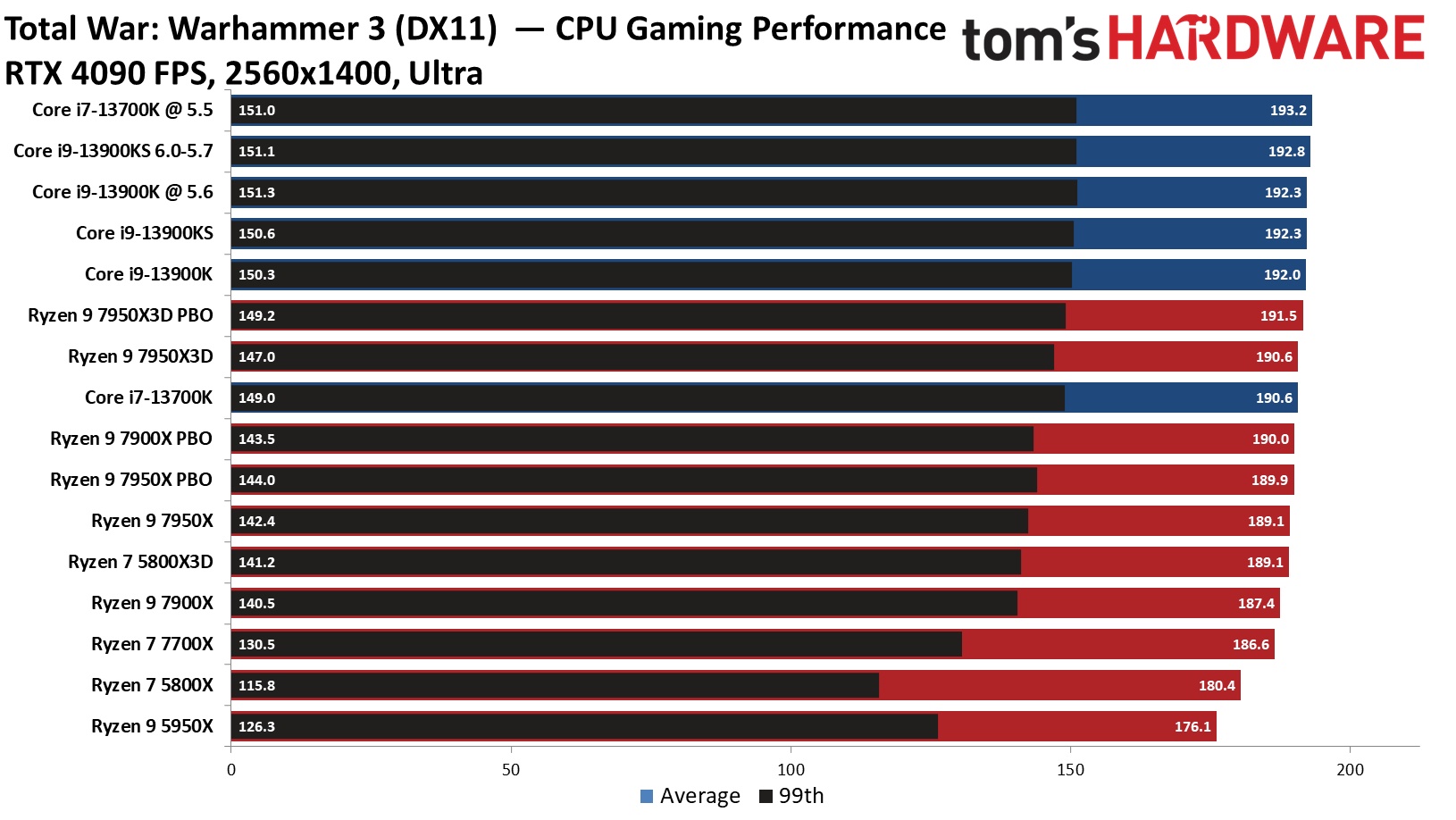
The Ryzen 9 7950X3D brings the Zen 4 family to near-parity with the Intel lineup in this title, but as you can see, we’re near a graphics bottleneck.
Watch Dogs Legion Benchmarks on AMD Ryzen 9 7950X3D
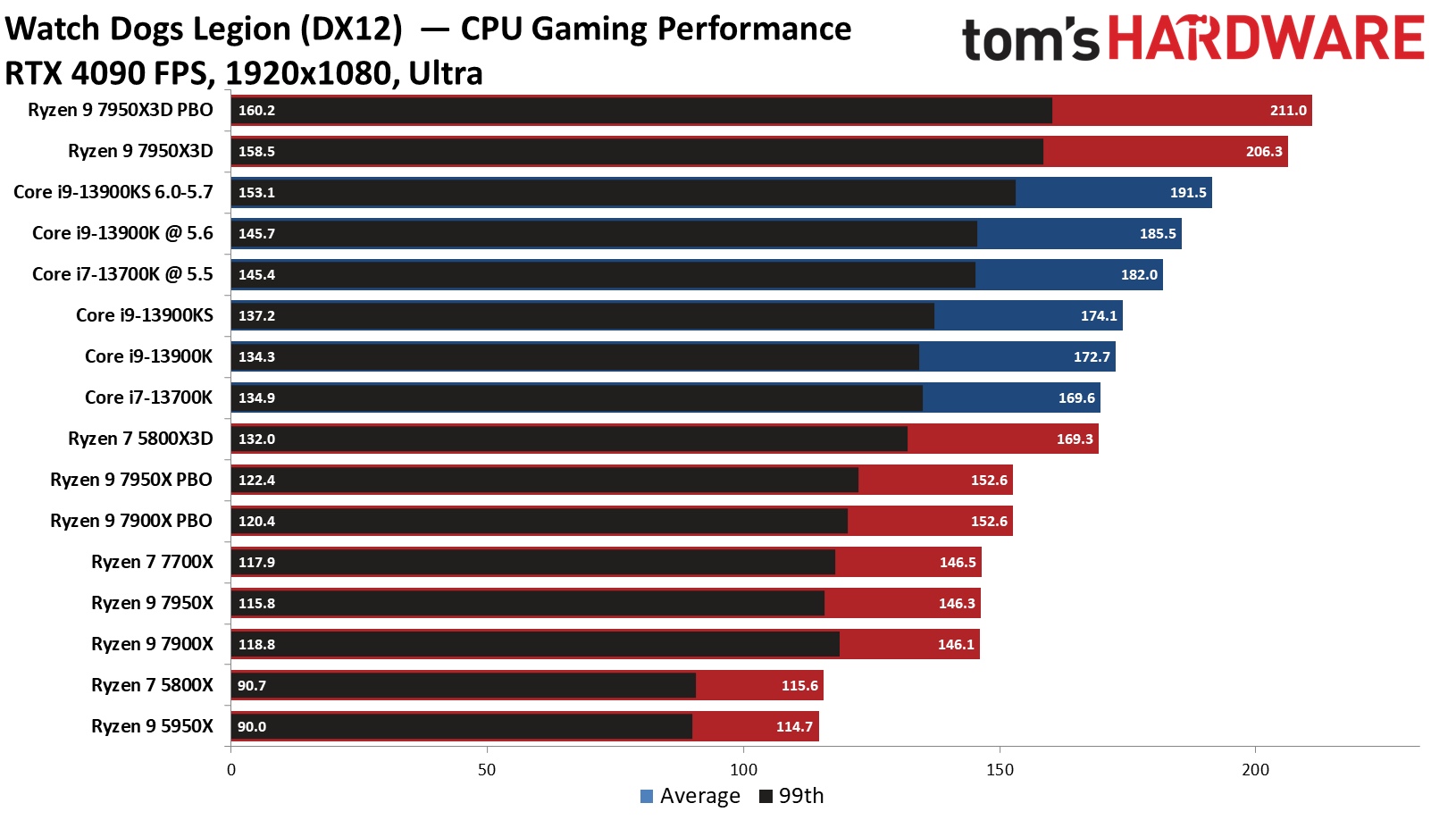
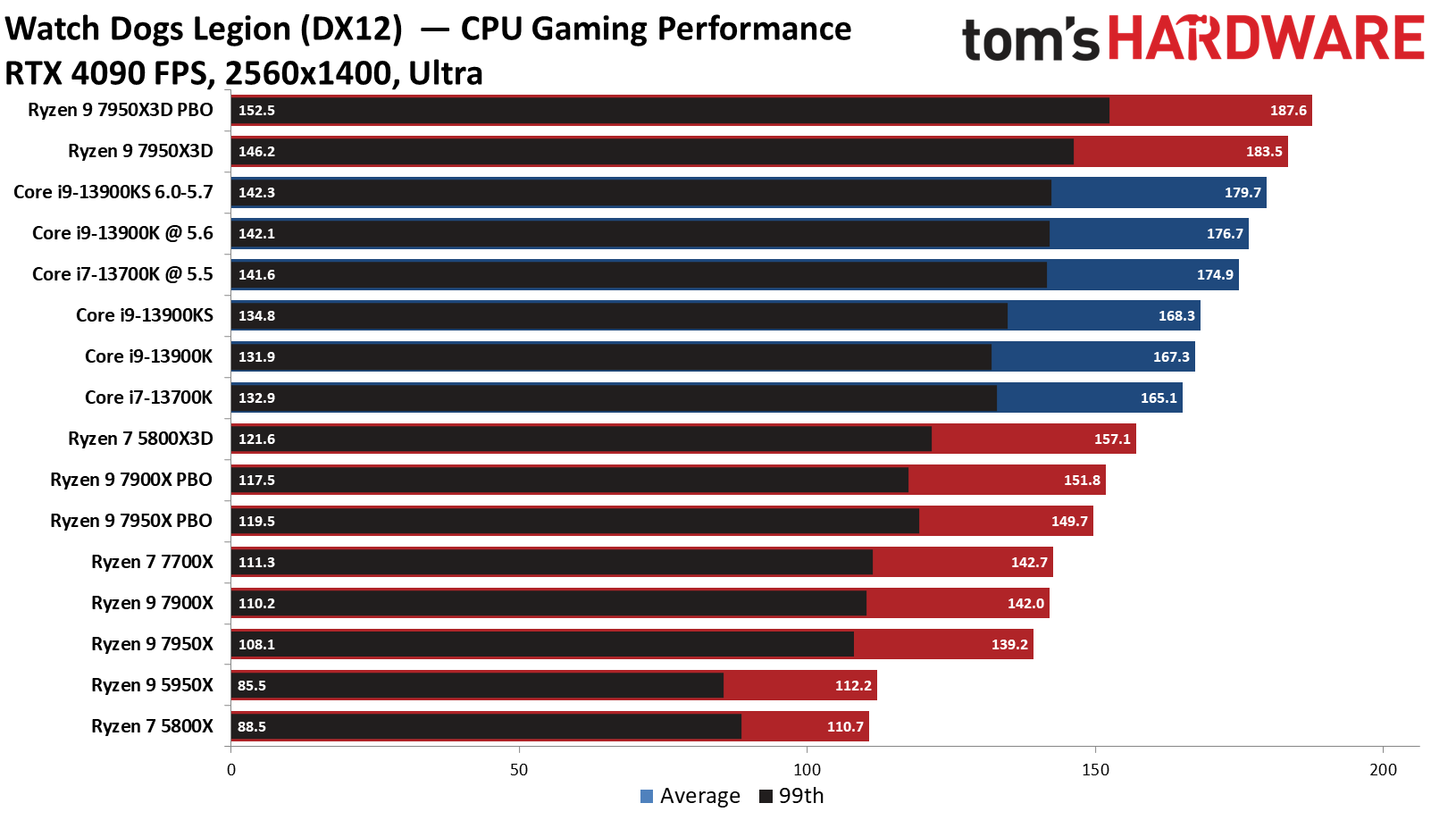
The Ryzen 9 7950X3D is 19% faster than the Core i9-13900K in this title, and 41% faster than the 7950X. Again, that performance improvement is within 5% of the gain for the 5800X3D over the 5800X.
Extra AMD Ryzen 9 7950X3D Game Benchmarks - GTA V, Project Cars 3, Shadow of the Tomb Raider, Far Cry 5, Borderlands 3
| Tom's Hardware - 1080p Extras | Ryzen 9 7950X3D | Core i9-13900K | 7950X3D vs 13900K |
| Grand Theft Auto V | 182.4 fps | 185.5 fps | -1.7% |
| Project Cars 3 | 357.6 fps | 295 fps | +21.2% |
| Shadow of the Tomb Raider | 332.2 fps | 274.6 fps | +21% |
| Borderlands 3 | 231.6 fps | 186.4 fps | +24.3% |
| Horizon Zero Dawn | 264.7 fps | 218 fps | +21.4% |
Admittedly, this is not the best way to present this set of test results but after seeing some of the large deltas in our test suite, we wanted to expand our view to a few more game titles that we don't normally test. As such, we threw together this quick table to give a basic view of a different mix of game titles with stock processor settings.
These numbers aren't reflected in our overall geometric mean listed above but provide further context. Regardless, we can see that the Ryzen 9 7950X3D provides exceptional 13900K-beating performance in a broad range of titles, with results ranging from -1.7% to +24.3%.
AMD's Ryzen 9 7950X3D Benchmarks
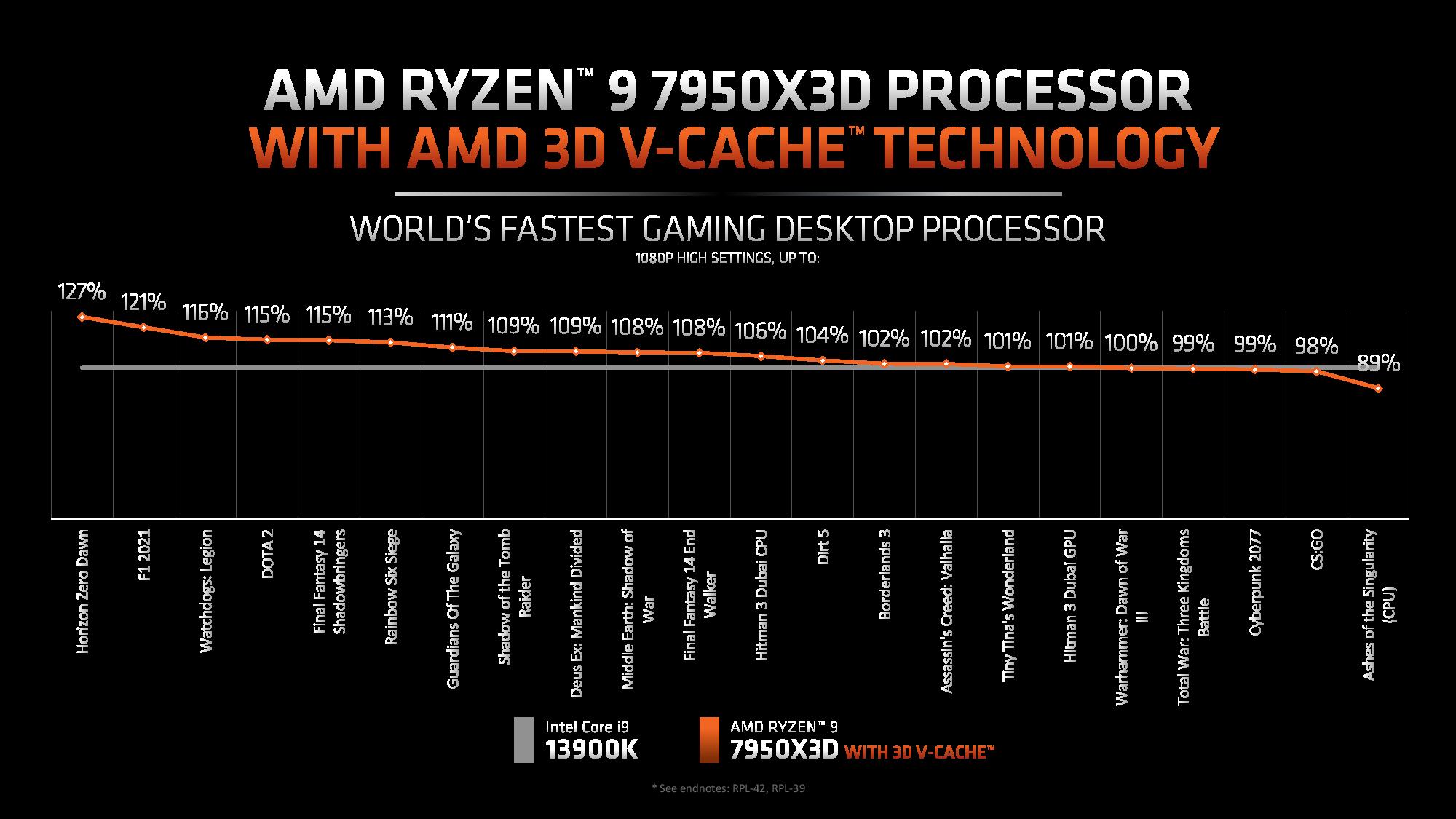
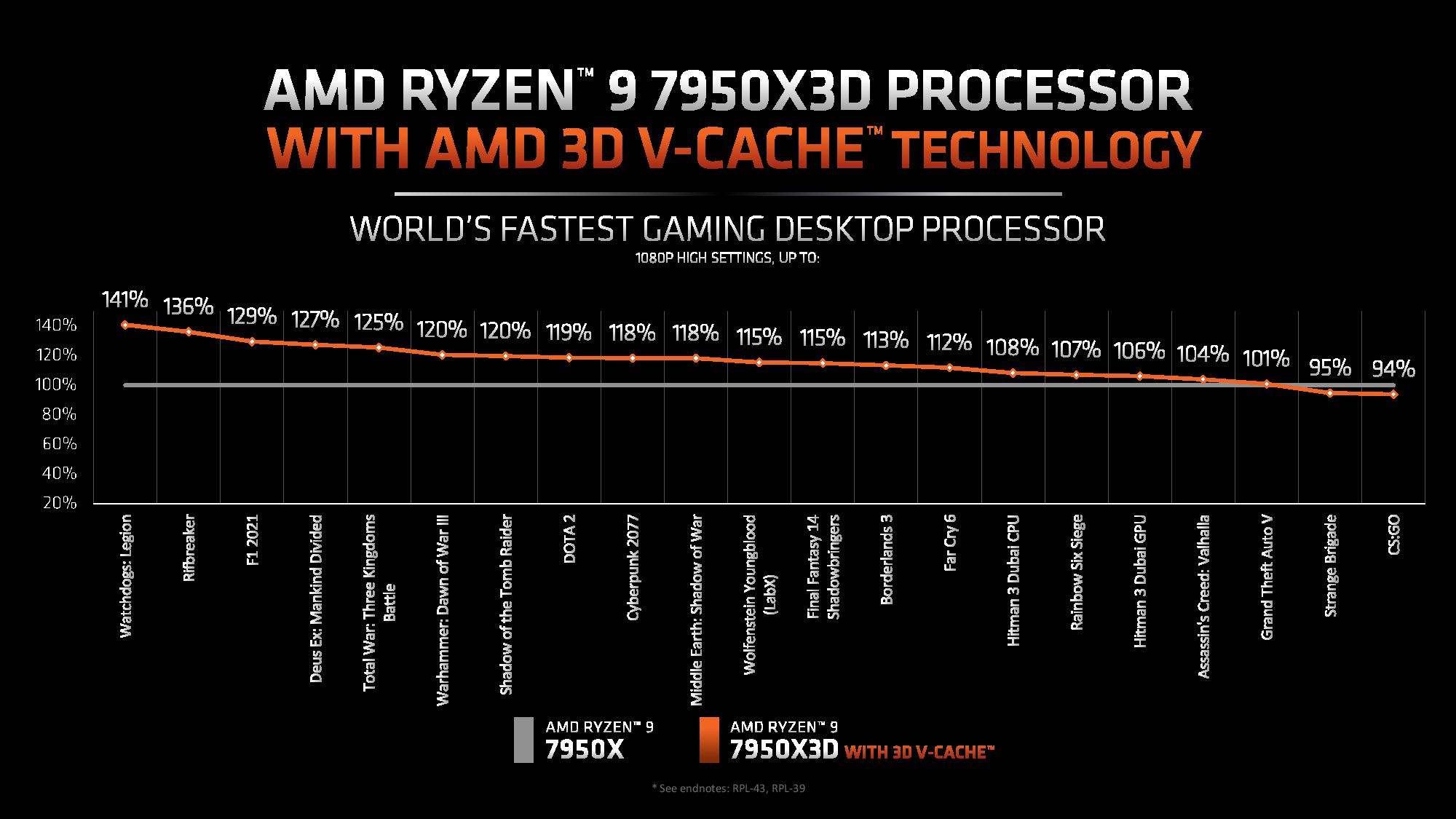
AMD has provided its own benchmarks for the 7950X3D; as with all vendor-provided benchmarks, you should take them with a grain of salt. We typically wouldn’t share vendor-provided tests in our reviews, but we’re making an exception because the 7950X3D doesn’t improve performance in all titles, and this more expansive list provides additional context.
- MORE: Best CPU for gaming
- MORE: CPU Benchmark Hierarchy
- MORE: Intel vs AMD
- MORE: How to Overclock a CPU
Current page: AMD Ryzen 9 7950X3D Gaming Benchmarks
Prev Page AMD Ryzen 9 7950X3D: Integrated GPU Benchmarks, Overclocking and Test Setup Next Page AMD Ryzen 9 7950X3D Productivity Benchmarks
Paul Alcorn is the Editor-in-Chief for Tom's Hardware US. He also writes news and reviews on CPUs, storage, and enterprise hardware.
-
PlaneInTheSky ReplySteep pricing
The cons just weigh too heavy for me to even consider the CPU or the AM5 platform.
No support for DDR4 memory
Reduced performance in some productivity apps
I already have DDR4. AMD expects me to just throw this into the trash and buy expensive new DDR5 for a 1% difference in performance. It even bothers me from an e-waste perspective, let alone the financial cost.
The fact performance of X3D CPU is all over the place bothers me too. Yes it's fast in -some- games, but then you get less overall performance in several important applications. If I just used my PC for gaming, I would have bought a console, I don't like the idea of having to make a trade-off with X3D CPU.
Another thing is, and this is not AMD specific but PC specific. The biggest issue with gaming on PC has been stuttering because shaders need to be runtime compiled on PC. This CPU will not solve this. When PC gaming becomes a meme, #stutterstruggle, I don't think many people are going to be willing to invest in $600+ CPU. Solve this problem, PC gaming is currently in shambles. -
cknobman Every single media outlet beating the "DDR5 cost" dead horse over and over again.Reply
When talking about ultimate gaming performance, which these 3D chips are designed for, saying the platform cost of DDR5 is a negative is stupid.
DDR4 is a dead end and should only be considered for budget builds and upgrades on older systems at this point.
Just let the "platform cost" argument go, otherwise test Intel with DDR4 and make proper comparisons showing what you get going with older and slower technology. -
PEnns Wow, AMD is for once forcing users to upgrade to new hardware.......and DDR5! How horrible!!Reply
I heard that lame story so many times before, Intel does it every 2-3 years!!! -
drivinfast247 Reply
I don't think they're targeting you specifically. No need to upgrade if not needed. Don't forget there's other people whom may be building their first PC or upgrading from a very old platform and the performance increase will be astronomical.PlaneInTheSky said:The cons just weigh too heavy for me to even consider the CPU or the AM5 platform.
I already have DDR4. AMD expects me to just throw this into the trash and buy expensive new DDR5 for a 1% difference in performance. It even bothers me from an e-waste perspective, let alone the financial cost.
The fact performance of X3D CPU is all over the place bothers me too. Yes it's fast in -some- games, but then you get less overall performance in several important applications. If I just used my PC for gaming, I would have bought a console, I don't like the idea of having to make a trade-off with X3D CPU.
Another thing is, and this is not AMD specific but PC specific. The biggest issue with gaming on PC has been stuttering because shaders need to be runtime compiled on PC. This CPU will not solve this. When PC gaming becomes a meme, #stutterstruggle, I don't think many people are going to be willing to invest in $600+ CPU. Solve this problem, PC gaming is currently in shambles.
Curious as to what games are struggling to run on PC and also what PCs are struggling to run games? Also, are those affected games also having issues on consoles?
My PC runs every game that I play without issues. And with the recent GPU upgrade I'll be happy for another year or so and will upgrade when needed. -
Elusive Ruse Reply
Ah cut the crap will you?PlaneInTheSky said:The cons just weigh too heavy for me to even consider the CPU or the AM5 platform.
I already have DDR4. AMD expects me to just throw this into the trash and buy expensive new DDR5 for a 1% difference in performance. It even bothers me from an e-waste perspective, let alone the financial cost.
The fact performance of X3D CPU is all over the place bothers me too. Yes it's fast in -some- games, but then you get less overall performance in several important applications. If I just used my PC for gaming, I would have bought a console, I don't like the idea of having to make a trade-off with X3D CPU.
Another thing is, and this is not AMD specific but PC specific. The biggest issue with gaming on PC has been stuttering because shaders need to be runtime compiled on PC. This CPU will not solve this. When PC gaming becomes a meme, #stutterstruggle, I don't think many people are going to be willing to invest in $600+ CPU. Solve this problem, PC gaming is currently in shambles.
You have no intention of upgrading to anything, you have admitted it before. All you do here is dump on new tech because for some reason you cannot deal with change. You have an axe to grind when it comes to AMD and anything that puts your fossil of a setup into perspective.PlaneInTheSky said:My PC from 14 years ago still browses the internet just fine. It still does Spotify, Netflix, indie gaming, etc.
At some point your average PC became "good enough" for most tasks.
This is starting to happen with PC gaming too. While AAA developers still bother to spend years making "uber graphics", most developers have long stopped with this rat race because better graphics rarely translates to better sales.
-
Elusive Ruse Reply
Especially considering that Intel's 13th gen would take a massive performance plunge if paired with DDR4.cknobman said:Every single media outlet beating the "DDR5 cost" dead horse over and over again.
When talking about ultimate gaming performance, which these 3D chips are designed for, saying the platform cost of DDR5 is a negative is stupid.
DDR4 is a dead end and should only be considered for budget builds and upgrades on older systems at this point.
Just let the "platform cost" argument go, otherwise test Intel with DDR4 and make proper comparisons showing what you get going with older and slower technology.
It is intellectually disingenuous to put lack of DDR4 support as a con here, if only for the reason that it has already been established that AM5 doesn't support it. Is Tom's Hardware going to put "Lack of DDR4 support" as a con for every CPU that comes out from now on? -
lmcnabney Excellent article.Reply
I noted that Paul mentioned AMD's specification to use water-cooling on the X3D lineup. After noting the low power usage of these chips I am curious as to why. Has the chip been tested using a more typical air cooled tower fan (with both standard, PBO, and PBO-UV) to determine if water-cooling is even necessary? -
Elusive Ruse Reply
According to AMD, V-cache is sensitive to heat; that's why they decreased the TjMax to 89c and reduced the TDP as well. I assume that's also why they instructed reviewers to use water-cooling.lmcnabney said:Excellent article.
I noted that Paul mentioned AMD's specification to use water-cooling on the X3D lineup. After noting the low power usage of these chips I am curious as to why. Has the chip been tested using a more typical air cooled tower fan (with both standard, PBO, and PBO-UV) to determine if water-cooling is even necessary? -
Alvar "Miles" Udell 13% faster in games at 1920x1080 comparing stock to stock for 20% more money (or 25% if using the current discount)...that's proper gamer logic for sure.Reply
If anything it's an advertisement for the 5800x3d. 16% slower at 1920x1080 yet only 44% of the price, plus the platform cost is far cheaper and all you sacrifice is PCIe 5.0.
